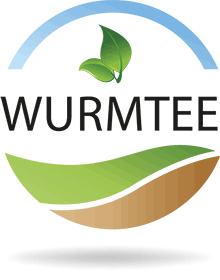Wissenschaftliche Artikel über die Herstellung von Wurmhumus:
- Edwards CA (1998) The use of earthworms in the breakdown and management of organic wastes. In: Edwards CA (ed) Earthworm Ecology, CRC Press, Boca Raton. pp 327-354
- Atiyeh RM, Subler S, Edwards CA, Bachman G, Metzger JD, Shuster W (2000) Effects of vermicomposts and composts on plant growth in horticulture container media and soil. Pedobiologia 44:579-590
- Arancon NQ, Edwards CA, Atiyeh R, Metzger JD (2004) Effects of vermicomposts produced from food waste on the growth and yields of greenhouse peppers. Bioresour Technol 93:139-144
Wurmkompostierung und ihre Rolle in der Abfallwirtschaft:
- Banu JR, Logakanthi S, Vijayalakshmi GS (2001) Biomanagement of paper mill sludge using an indigenous (Lampito mauritii) and two exotic (Eudrilus eugineae and Eisenia foetida) earthworms. J Environ Biol 22:181-185
- Asha A, Tripathi AK, Soni P (2008) Vermicomposting: A Better Option for Organic Solid Waste Management. J Hum Ecol 24:59-64
Unterschiedliche mikrobielle Prozesse bei Thermokompost und Wurmkompostierung:
- Fracchia L, Dohrmann AB, Martinotti MG, Tebbe CC (2006) Bacterial diversity in a finished compost and vermicompost: differences revealed by cultivation independent analyses of PCR-amplified 16S rRNA genes. Appl Microbiol Biotechnol 71:942-952
- Lazcano C, Gomez-Brandon M, Dominguez J (2008) Comparison of the effectiveness of composting and vermicomposting for the biological stabilization of cattle manure. Chemosphere 72:1013-1019
- Gandhi M, Sangwan V, Kapoor KK, Dilbaghi N (1997) Composting of household wastes with and without earthworms. Environ Ecol 15:432-434
- Bhatnagar RK, Palta RK (1996) Earthworm-Vermiculture and Vermicomposting. Kalyani Publishers, New Delhi.Atiyeh RM, Dominguez J, Subler S, Edwards CA (2000) Changes in biochemical properties of cow manure during processing by earthworms (Eisenia andrei, Bouché) and the effects on seedling growth. Pedobiologia 44:709-724
- Atiyeh RM, Dominguez J, Subler S, Edwards CA (2000) Changes in biochemical properties of cow manure during processing by earthworms (Eisenia andrei, Bouché) and the effects on seedling growth. Pedobiologia 44:709-724
- Subler S, Edwards CA, Metzger PJ (1998) Comparing vermicomposts and composts. Biocycle 39:63-66
- Lazcano C, Gomez-Brandon M, Dominguez J (2008) Comparison of the effectiveness of composting and vermicomposting for the biological stabilization of cattle manure. Chemosphere 72:1013-1019
- Gandhi M, Sangwan V, Kapoor KK, Dilbaghi N (1997) Composting of household wastes with and without earthworms. Environ Ecol 15:432-434
- Bhatnagar RK, Palta RK (1996) Earthworm-Vermiculture and Vermicomposting. Kalyani Publishers, New Delhi.
- Atiyeh RM, Dominguez J, Subler S, Edwards CA (2000) Changes in biochemical properties of cow manure during processing by earthworms (Eisenia andrei, Bouché) and the effects on seedling growth. Pedobiologia 44:709-724
- Subler S, Edwards CA, Metzger PJ (1998) Comparing vermicomposts and composts. Biocycle 39:63-66
- Lazcano C, Gomez-Brandon M, Dominguez J (2008) Comparison of the effectiveness of composting and vermicomposting for the biological stabilization of cattle manure. Chemosphere 72:1013-1019
- Vivas A, Moreno B, Garcia-Rodriguez S, Benitez E (2009) Assessing the impact of composting and vermicomposting on bacterial community size and structure, and functional diversity of an olive-mill waste. Bioresour Technol 100:1319-132
- Benitez E, Nogales R, Elvira C, Masciandaro G, Ceccanti B (1999) Enzymes activities as indicators of the stabilization of sewage sludges composting by Eisenia foetida. Bioresour Technol 67:297-303
- Ndegwa PM, Thompson SA, Das KC (2000) Effects of stocking density and feeding rate on vermicomposting of biosolids. Bioresour Technol 71:5-12
- Lazcano C, Gomez-Brandon M, Dominguez J (2008) Comparison of the effectiveness of composting and vermicomposting for the biological stabilization of cattle manure. Chemosphere 72:1013-1019
- Aira M, Gómez-Brandón M, González-Porto P, Domínguez J (2011) Selective reduction of the pathogenic load of cow manure in an industrial-scale continuous-feeding vermireactor. Bioresource Technol 102:9633-9637
- Edwards CA (1988) Breakdown of animal, vegetable and industrial organic wastes by earthworms. In: Edwards CA, Neuhauser EF (eds) Earthworms in Waste and Environmental Management SPB, The Hague, Netherlands. pp 21-31
- Tajbakhsh J, Abdoli MA, Mohammadi Goltapeh E, Alahdadi I, Malakouti MJ (2008) Trend of physico-chemical properties change in recycling spent mushroom compost through vermicomposting by epigeic earthworms Eisenia foetida and E. andrei. J Agric Technol 4:185-198
- Hartenstein R, Neuhauser EF, Kaplan DL (1979) Reproductive potential of the earthworm Eisenia foetida. Oecologia 43:329-340
- Edwards CA, Dominguez J, Neuhauser EF (1998) Growth and reproduction of Perionyx excavatus (Perr.) (Megascolecidae) as factors in organic waste management. Biol Fertil Soils 27:155-161
- Chan LPS, Griffiths DA (1988) The vermicomposting of pretreated pig manure. Biol Wastes 24:57-69
- Reeh U (1992) Influence of population densities on growth and reproduction of the earthworm Eisenia andrei on pig manure. Soil Biol Biochem 24:1327-1331
- Butt KR (1993) Utilization of solid paper mill sludge and spent brewery yeast as a feed for soil dwelling earthworms. Bioresour Technol 44:105-10
- Gunathilagraj K, Ravignanam T (1996) Vermicomposting of sericulture wastes. Madras Agric J 83:455-45
- Mitchell MJ, Hornor SG, Abrams BI (1980) Decomposition of sewage sludge in drying beds and the potential role of the earthworm, Eisenia foetida. J Environ Qual 9:373-378
- Dominguez J, Edwards CA, Webster M (2000) Vermicomposting of sewage sludge: effects of bulking materials on the growth and reproduction of the earthworm Eisenia andrei. Pedobiologia 44:24-32
- Bansal S, Kapoor KK (2000) Vermicomposting of crop residues and cattle dung with Eisenia foetida. Bioresour Technol 73:95-98
- Gajalakshmi S, Ramasamy EV, Abbasi SA (2001) Assessment of sustainable vermiconversion of water hyacinth at different reactor efficiencies employing Eudrilus engeniae Kingburg. Bioresour Technol 80:131-135
- Gunadi B, Blount C, Edward CA (2002) The growth and fecundity of Eisenia foetida (Savigny) in cattle solids pre-composted for different periods. Pedobiologia 46:15-2
- Butt KR (1993) Utilization of solid paper mill sludge and spent brewery yeast as a feed for soil dwelling earthworms. Bioresour Technol 44:105-107
- Elvira C, Dominguez J, Sampedro L, Mato S (1995) Vermicomposting for the pulp industry. Biocycle 36:62-63
- Gajalakshmi S, Ramasamy EV, Abbasi SA (2002) Vermicomposting of paper waste with the anecic earthworm Lampito mauritii Kingburg. Indian J Chem Technol 9:306-311
- Elvira C, Sampedro L, Dominguez J, Mato S (1997) Vermicomposting of wastewater sludge from paper-pulp industry with nitrogen rich materials. Soil Biol Biochem 9:759-762
- Banu JR, Logakanthi S, Vijayalakshmi GS (2001) Biomanagement of paper mill sludge using an indigenous (Lampito mauritii) and two exotic (Eudrilus eugineae and Eisenia foetida) earthworms. J Environ Biol 22:181-185
- Albanell E, Plaixats J, Cabrero T (1988) Chemical changes during vermicomposting (Eisenia fetida) of sheep manure mixed with cotton industrial wastes. Biol Fertil Soils 6:266-269
- Sinha RK, Heart S, Agarwal S, Asadi R, Carretero E (2002) Vermiculture technology for environmental management: study of the action of the earthworms Eisenia foetida, Eudrilus euginae and Perionyx excavatus on biodegradation of some community wastes in India and Australia. The Environmentalist 22:261-268
- Edwards CA, Burrows I, Fletcher KE, Jones BA (1985) The use of earthworms for composting farm wastes. In: Gasser JKR (ed) Composting Agricultural and Other Wastes, Elsevier, London. pp 229-241
- Edwards CA (1988) Breakdown of animal, vegetable and industrial organic wastes by earthworms. In: Edwards CA, Neuhauser EF (eds) Earthworms in Waste and Environmental Management SPB, The Hague, Netherlands. pp 21-31
- Sharma S, Pradhan K, Satya S, Vasudevan P (2005) Potentiality of earthworms for waste management and in other uses - A Review. The Journal of American Science 1:4-16
Wirkungen von Wurmkompostierung auf PH-Wert, die elektrische Leitfähigkeit (EC), C; N-Verhältnis und Umwandlung von Nährstoffen in pflanzenverfügbare Form:
- Gandhi M, Sangwan V, Kapoor KK, Dilbaghi N (1997) Composting of household wastes with and without earthworms. Environ Ecol 15:432-434
- Atiyeh RM, Subler S, Edwards CA, Bachman G, Metzger JD, Shuster W (2000) Effects of vermicomposts and composts on plant growth in horticulture container media and soil. Pedobiologia 44:579-590
- Nardi S, Dell'Agnola G, Nuti PM (1983) Humus production from farmyard wastes by vermicomposting. Proc. Int. Symp. On Agricultural and Environmental Prospects in Earthworm Farming. Rome. pp 87-94
- Mitchell A (1997) Production of Eisenia fetida and vermicompost from feed-lot cattle manure. Soil Biol Biochem 29:763-766
- Riffaldi R, Levi-Minzi R (1983) Osservazioni preliminari sul ruolo dell Eisenia foetida nell'umificazione del letame. Agrochimica 27:271-274
- Albanell E, Plaixats J, Cabrero T (1988) Chemical changes during vermicomposting (Eisenia fetida) of sheep manure mixed with cotton industrial wastes. Biol Fertil Soils 6:266-269
- Hashemimajd K, Kalbasi M, Golchin A, Shariatmadari H (2004) Comparison of vermicompost and composts as potting media for growth of tomatoes. J Plant Nutr 27:1107-1123
- Lazcano C, Gomez-Brandon M, Dominguez J (2008) Comparison of the effectiveness of composting and vermicomposting for the biological stabilization of cattle manure. Chemosphere 72:1013-1019
- Lazcano C, Gomez-Brandon M, Dominguez J (2008) Comparison of the effectiveness of composting and vermicomposting for the biological stabilization of cattle manure. Chemosphere 72:1013-1019
- Chan LPS, Griffiths DA (1988) The vermicomposting of pretreated pig manure. Biol Wastes 24:57-69
- Subler S, Edwards CA, Metzger PJ (1998) Comparing vermicomposts and composts. Biocycle 39:63-66
- Elvira C, Sampedro L, Benítez E, Nogales R (1998) Vermicomposting of sludges from paper mill and dairy industries with Eisenia andrei: a pilot-scale study. Bioresour Technol 63:205-211
- Garg P, Gupta A, Satya S (2006) Vermicomposting of different types of waste using Eisenia foetida: a comparative study. Bioresour Technol 97:391-395
- Holtzclaw KM, Sposito G (1979) Analytical properties of the soluble metal-complexing fractions in sludge-soil mixtures. IV. Determination of carboxyl groups in fulvic acid. Soil Sci Soc Am J 43:318-323
- Albanell E, Plaixats J, Cabrero T (1988) Chemical changes during vermicomposting (Eisenia fetida) of sheep manure mixed with cotton industrial wastes. Biol Fertil Soils 6:266-269
- Hand P, Hayes WA, Frankland JC, Satchell JE (1988) Vermicomposting of cow slurry. Pedobiologia 31:199-209


